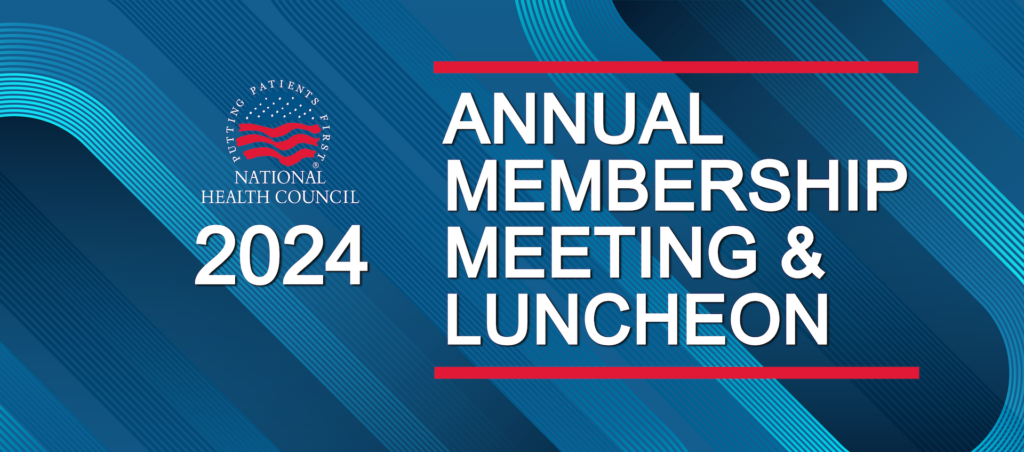

NHC Medicare Drug Price Negotiation Program Comments
By: Allen Pinn, Coordinator, Policy
April 14, the National Health Council (NHC) submitted comments to the Centers for Medicare & Medicaid Services (CMS) regarding the Medicare Drug Price Negotiation Program, established under the Inflation Reduction Act. The comments submitted by the NHC kept patients’ experiences and access to health care at the forefront. Below is a summary of the comments.
External Data Submission Timing
The NHC strongly advocates for CMS to give patients adequate time to share their data and firsthand experiences related to drugs selected for the negotiation program. Thirty days to submit comments is not enough time to give organizations, who lack data analysis and research departments. The NHC asks CMS to consider the toll of data collection and research and urges them to reassess timeframes for submissions.
Patient Experiences and Engagement
Incorporating the voices of patients is the bedrock of the NHC’s policy recommendations. The NHC urges CMS to ensure data explicitly related to the value of patients is prioritized when evaluating data. The NHC would like CMS to consider the following six domains listed below when evaluating the clinical benefits of drugs.
- Patient Partnership
- Transparency
- Representativeness
- Diversity
- Outcomes Patients Care About
- Patient Centered Data Sources and Methods
- Timeliness
A more detailed summary of the six domains can be found in the NHC Rubric to Capture the Patient Voice: A Guide to Incorporating the Patient Voice into the Health Ecosystem.
The NHC believes CMS should develop a patient engagement infrastructure to continue hearing insight from patients on the IRA’s implementation.
Quality-Adjusted Life-Years in the Negotiation Process
The NHC is appreciative that CMS will not use QALYs as part of the Medicare Drug Negotiation Program. QALYs can be discriminatory in practice, and the NHC applauds CMS decision to not use them as metrics in the negotiation process. We also expressed concern that CMS may not effectively eliminate QALYs from analysis by utilizing studies that use QALY-related data from secondary sources, or that CMS may over- exclude analyses that are otherwise helpful in establishing the value of a drug. We asked CMS for more clarity on how they will exclude QALYs from these studies. The NHC does not endorse a single metric to be used in the negotiation process; however, the process should be met with a variety of approaches. Our organization recommends leveraging multiple metrics centered on patient experience data and input.
Input Process for Future Guidance
The NHC is seeking further clarification on providing feedback for future years of the program. The NHC seeks to know what opportunities CMS plans to put forth for stakeholders to provide adequate feedback for program guidance for 2027 and beyond. Due to the newness of the negotiation process, the NHC is arguing that CMS should allow patients and stakeholders to provide consistent feedback in an organized and meaningful process.
Explanation for the Maximum Fair Price (MFP)
A critical piece in the negotiation program’s success will be the MFP’s explanation. It is critical that explanations of the MFP are made accessible and transparent to the patient community. Among other important pieces of information, the patient community would benefit in knowing how patient experience data was or was not incorporated into the negotiation. The NHC would also like to make CMS aware that the March 2025 deadline to 2026 MFPs coincides with other critical deadlines such as the IPAY 2027 deadline to submit information for selected drugs. The NHC is urging CMS to reevaluate its deadlines/timeframes to give organizations sufficient time to gain insights from the first set of negotiations to create appropriate submissions in future years.
Requirements for Coverage
Patients’ access to medicine is a crucial element in their health care experience. CMS should ensure patients access to medicine with as few barriers as possible. Although barriers such prior authorization are often grounded in patient safety, rarely do such interventions involve patient input. In moving forward with the negotiation program, the NHC believes it is necessary that CMS clearly define coverage requirements. Defining coverage requirements in Part D and/or other payment rules will ensure patients have appropriate guardrails to assure them access to life-saving medications.
Drug Selection
The drug selection process will play a critical role in the negotiation process. Although CMS is not seeking feedback on their drug selection process, the NHC still has additional comments. For instance, the NHC has concerns about the impact of drugs with the same active ingredients in the selection process on future research. Innovation is a driving force in the improvement of patient outcomes, and this improvement is often incremental and comes after FDA approval. The NHC asks CMS to create appropriate guardrails to encourage manufacturers to develop new indications and forms of administration to improve patients’ experiences. The NHC recommends CMS reconsiders its approach or at least allow stakeholders to the opportunity to comment on the selection process in future years.
Conclusion
Changes to Medicare drug coverage will have immense consequences for the patient community. As these processes begin, the NHC is advocating for continued monitoring of the Inflation Reduction Act’s implementation process to ensure stated goals are being achieved. The NHC recommends CMS take steps to receive ongoing feedback from the patient community in a formalized process. The voices of patients and patient organizations in the negotiation process are vital to a smooth transition.
To read the NHC’s full comments, click here.


